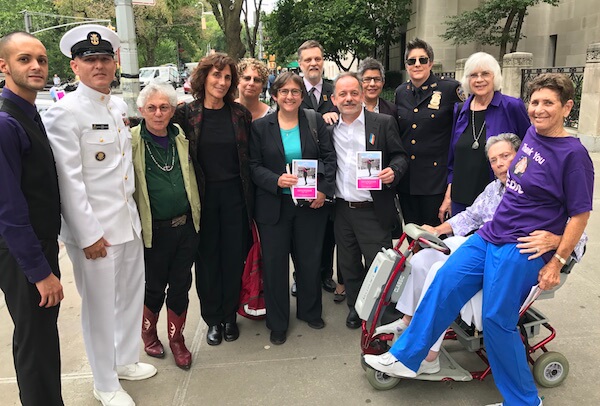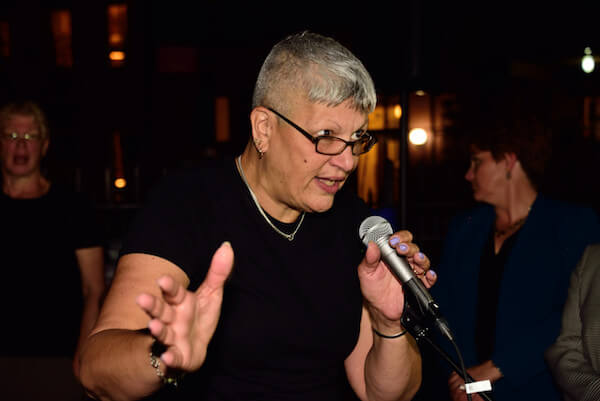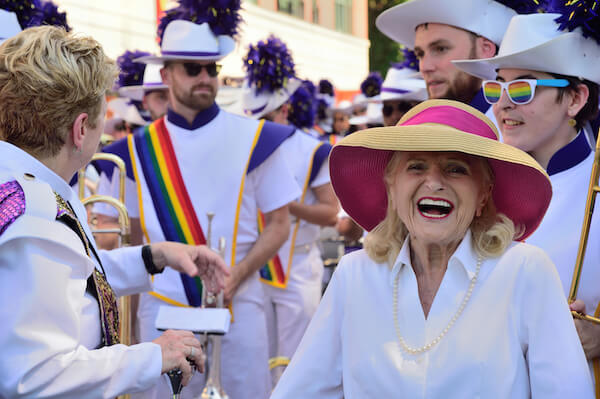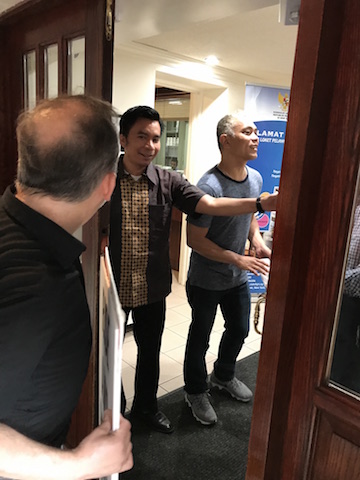COVER ILLUSTRATION BY MICHAEL SHIREY
The world watched Ireland on May 22, when its citizens went to the polls to vote on referendum proposals to amend their constitution. Of the two measures up for a vote, this is the one that brought out nearly 2 million of the country’s 4.6 million residents: “Marriage may be contracted in accordance with law by two persons without distinction as to their sex.”
And when the ballots were tallied, “Yes” won, with 1.2 million votes to the “No” side’s 734,300 — a 62-38 percent margin with a turnout of 61 percent of the eligible electorate. The landslide was helped along by thousands of Irish emigrants, who, due to the lack of an absentee ballot option, returned from all over the world to vote. #hometovote was one of the top hashtags on Twitter late last week, as returnees arrived by plane, ferry, bus, and train.
When the marriage referendum was announced in February, organizers began a grassroots outreach that literally went door-to-door throughout the country to persuade people to vote “Yes.”
Irish activists and artists cheered by the breadth of marriage equality’s victory
“I was continually surprised by an overall feeling of genuine support from people on the street,” said Sonya Mulligan, a Dublin-based director and filmmaker. “However, there was a small percentage of the population who were vehemently opposed to any changes in the institution of marriage. We were spat at, called immoral, told we’d rot in hell, were vile, had no morals, called pedophiles, and had comments like ‘Fucking Lezzers’ shouted from cars passing by.”
Jenny Butler, a producer of online and media content, was spared that kind of response.
“I know that some people had terrible experiences of verbal abuse but they just kept going, and anyone I spoke to who had been canvassing said that the good far outweighed the bad,” she said. “I was fortunate not to have met with very negative responses.”
Though her devout Catholic parents voted “No,” Butler said she was heartened by the overall response to her campaigning.
The “Yes” campaign takes its message to Ballyfermot. | YESEQUALITY.IE
New York-based filmmaker and activist Brendan Fay returned to his hometown of Drogheda, with his husband, Dr. Tom Moulton, a pediatric oncologist, and spent the weeks before the referendum canvassing in County Louth. Fay made it a point to attend a “Vote No” meeting.
“I found that they had a much smaller turnout than I expected,” he said. “I wanted all the people there to meet and hear from a local gay married person. They were a bit taken aback, especially when they heard I met Tom at Sunday Mass and about our involvement with Dignity,” the LGBT Catholic organization.
For Fay, who left Ireland in the 1980s, and other Irish activists and organizers who created the LGBT movement in Ireland after the 1993 decriminalization of homosexuality, marriage equality was an idea that seemed impossible until recently.
“In my time, being gay was something you could never admit to, not even to yourself,” said actress and playwright Eilish O’Carroll, who married and had children before coming out as a lesbian in her 40s. “It was a lonely and isolated existence for so many of us. I might add the amount of older, high-profile people who came out prior to the referendum would astound you.”
Brendan Fay campaigns in his native Drogheda, Ireland. | COURTESY: BRENDAN FAY
O’Carroll is a star of the Irish sitcom “Mrs. Brown’s Boys,” in which the title role is played by her brother, Brendan O’Carroll (in drag), and the cast includes an openly gay character. Irish popular culture wasn’t always this way.
“Ireland had such little media, we had no role models or reference points,” said Brian Merriman, who came of age before homosexuality was decriminalized but ended up working for the Equality Authority of the Irish government and founding the Mr. Gay Ireland pageant and the International Dublin Gay Theatre Festival. Merriman’s festival just finished its 12th year of presenting LGBT work by Irish and international artists.
“Even after decriminalization,” he said, “the pressure on us all to hide in a straight relationship or marriage was immense. I went to a Pride photo exhibition and was struck as to how everyone in the photos was wearing a mask — it was a turning point in me wanting to create a mainstream channel for our LGBT stories to be seen and heard in public.”
Father Bernárd Lynch reflects on Ireland's Declaration of Independence
Dani Malone is a communications specialist living in Sydney, Australia, and, in an email, she recalled, “I emigrated from Dublin when I was 20. My leaving was prompted by my coming out. I did come up against some homophobia in Ireland; not so much with ordinary people, more with the established authorities and religious ‘moral guardians.’”
Malone noted the irony that she and her fiancé can now get married in Ireland, but not in Australia.
Scott de Buitléir considered leaving Ireland to be with his partner if the referendum didn’t pass. As it is, the referendum fight led him to give up a radio show he founded and hosted on Irish radio (RTÉ). His program, “The Cosmo,” focused on LGBT life, but because of the laws requiring equal time for opposite sides of political issues, he found he couldn’t discuss the biggest event in Ireland’s gay civil rights history as it was unfolding before him.
“I felt sad that I had to leave under the circumstances,” de Buitléir said. “But I felt that I’d rather stand on the right side of history than retain my title as an RTÉ broadcaster. I was, and still am, very proud of the years of promoting LGBT issues and stories on national Irish radio, but RTÉ’s nervousness surrounding this referendum became too stifling for such a clearly pro-equality platform as LGBT programming.”
De Buitléir and his fellow presenter, Jenny Butler, resigned from the show about two weeks before the referendum.
“I felt silenced and very hypocritical,” Butler said, “because I was telling people that I supported marriage equality and how important it was to me that the referendum passed and urging people to vote “Yes,” but on-air, I was playing song after song, avoiding talking about an historic time in Irish history. I kept thinking of the people who fought to see equality in Ireland and around the world well before I was even born. I didn’t want to be silent.”
City Councilmember Daniel Dromm, an out gay Jackson Heights Democrat, flanked by Brian Silva, executive director of Marriage Equality USA, and Irish-American activist Brendan Fay at an April 30 New York City Hall rally in support of the Irish marriage referendum. | COURTESY: BRENDAN FAY
So off to the campaign they went. The “Yes” side had a lead in the pre-referendum polls, but no one pushing for the referendum considered the win a foregone conclusion.
“I couldn’t call it,” said Irish musician and storyteller Brian Fleming, who travels to New York City every year to help organize the Queens inclusive St. Pat’s for All concert and parade that Fay founded. “I think, on balance, I believed ‘Yes’ would win, but (a) it’s hard to imagine the status quo being overturned and (b) there’s a huge difference between doing well in opinion polls and doing well at the ballot box.”
Gareth Hurley, the company secretary of the Dublin Gay Theatre Festival, shared Fleming’s uncertainty.
“I knew that urban areas and young people would support the Yes campaign,” he said. “But what I didn’t know was whether that support would extend elsewhere. What was amazing was the strong backing for equality from rural Ireland and older people who had grown up in a very different country. It made this a victory for the entire country — and I hope the world. This referendum was not won in the last few weeks. It was won through years of conversation, debate, and LGBT people having the courage to tell their deeply personal stories. It was a triumph of valuing lived human experience over cold abstractions.”
As the ballots were counted, crowds gathered all over the country, including the courtyard of Dublin Castle, to wait for the official announcement. It became apparent early that “Yes” would win, and throughout the country, there were public celebrations that went on well into the night of May 23.
In Dublin, Rian Corrigan and his fiancé Ronald Mendez went to pick up the invitations for their upcoming civil union.
“The lovely lady at the printer had a look and said, ‘You’ve written ‘civil ceremony,’ but you now will have a marriage! Please let me re-print your invitations and change that word to wedding, free of charge.’” Corrigan said. “I nearly broke down! We would have emigrated if civil marriage didn’t pass, that’s for sure. Now we are hoping that by July 30, the constitution will have been amended. We could end up being one of the first couples to have a same-sex marriage here in Ireland! How amazing would that be?”
The crowds in the courtyard of Dublin Castle on May 23 awaiting announcement of the official vote count.
While this campaign is over, many of the people who worked for “Yes” vote say there’s more celebration — and work — to be done.
“I want to step back, recharge my creative batteries, and then come back onto the Irish media radar when I’m ready,” said Scott de Buitléir. “I’m not going away for too long!”
“I suppose I’ll start buying a few new bowties for all the weddings that will be taking place!” Jenny Butler declared.
“I am engaged to my English partner of two years, Victoria,” said Dani Malone. “My mother, Rita, who is also gay and part of an older Irish generation who are still healing from years of oppression, is now helping to organize my 2017 wedding in Dublin! I can’t wait! I will be marrying at the Unitarian Church on St. Stephen’s Green.”
Despite encountering pockets of hatred during the referendum campaign, Sonya Mulligan said the vote marks a profound change in Ireland.
“I do believe being involved in this campaign has changed me and many others,” she said. “I believe we all stand taller and I hope this feeling never fades.”
On May 23, one day after the vote, Brian Merriman discovered a new Dublin, as well.
“I spent Saturday afternoon walking in the city and it was as if I had never seen it before,” he said. “I know I now have a better place for the next generations to live and love in than was bequeathed to me — and that is our duty as we pass through this world.”








































